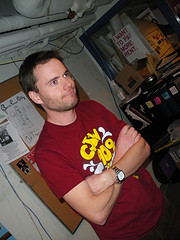 One of the first things I did after getting settled into University life — as soon as my courses were squared away and my name was on the audition sign up sheets for every Drama Department Production being launched — was to somehow get involved with CJSW, the campus radio station at the University of Calgary. Sequestered into a back corner of MacEwan Hall, it looked as unassuming as all the other offices operating there — except for the hundreds of record-industry promotional stickers all but obliterating one’s view into the station from the side windows — and the seemingly endless stream of the hippest, most fascinating people I’ve ever seen entering and leaving the station. I knew I had to be a part of it.
One of the first things I did after getting settled into University life — as soon as my courses were squared away and my name was on the audition sign up sheets for every Drama Department Production being launched — was to somehow get involved with CJSW, the campus radio station at the University of Calgary. Sequestered into a back corner of MacEwan Hall, it looked as unassuming as all the other offices operating there — except for the hundreds of record-industry promotional stickers all but obliterating one’s view into the station from the side windows — and the seemingly endless stream of the hippest, most fascinating people I’ve ever seen entering and leaving the station. I knew I had to be a part of it.
Established in 1955, CJSW had already had a rich and turbulent life by the time I had encountered it (the station survived a secret vote to shut it down and a lockout attempt by the Student’s Union in 1980, and then a complete withdrawal of the operating budget in 1982) — its struggles and tenacity have only added to its underdog, “maverick” status.
The station was small, cramped, and smelled vaguely of clove cigarettes. The furniture looked like — and likely was — once-glorious decommissioned pieces from a faculty lounge which underwent renovations in the late 60’s.
And the record library. Not unlike the folkloric fashion storage vault at Vogue Magazine, the CJSW Record Library was awe-inspiring; a religious experience. One had to just silently take in its floor-to ceiling row upon row of vinyl brilliance with reverence.
As interested as I was in the music, I knew that my passion would be to try to revive radio drama as a viable medium — not an easy task, as reinforced by the Drama Department’s lack of support (especially in their refusal in rewarding participation in such a venture with some credit towards grades). Attempts to air radio dramas — both pre-recorded and live — were only moderately successful in the past (and apparently have been attempted since my tenure there with negligible success) — I was involved with trying to resurrect a long-forgotten medium; an anachronism. While still pre-dating the jaded internet and DVD era, the entertainment-consuming public of the early ’80’s was still not inclined to gather ’round the radio and listen to “stories” anymore. This hindered me not for a second. Clad with the mis-guided confidence and full-on bravado of a first-year University student, I felt completely up for the challenge.
I thought it would be a true homage paid to the art form of radio drama to resurrect the original “Shadow” radio series — I secured the scripts and excitedly collaborated with my tireless and incredibly tolerant engineer, John Hedemark, over the right atmospheric music and sound effects –grossly underestimating the challenges of rounding up already time-stretched and stressed-out full-time drama students to fill the roles (and encountered the strange phenomenon of “mic fright” — ordinarily gregarious and extroverted student stage actors withering under the pressures of performing in front of a mic — even pre-taped, and especially live, which we did frequently.)
Compound that with the added challenges of time constraints (many sessions were delayed or shelved completely due to another show needing to get into the studio after our allotted time) and the technology of the time — with the necessity of literally splicing out bad takes from reel-to-reel with a razor blade– makes recording and editing with our current digital formats a blessing which shouldn’t ever be taken for granted.
Some highlights from “Hold This Radioactive Briefcase” (what we eventually named the show after holding a contest to name it — and yes, surprisingly, *that* was the winning suggestion):
1. After casting “12 Angry Men”, I experienced a mass exodus of cast drop-outs (I scheduled the taping, without thinking, near mid-terms) — in fact, due to only being able to assemble *three* men from the drama department (and by “assembling” I mean “lured with beer”), we managed to tape it with our remaining trio of actors, who — amazing as they were (are), still had to pull off scenes where they actually had to “object to” and “overrule” — themselves.
2. I adapted the screenplay of Alfred Hitchcock’s “Psycho” into a radio drama, and was convinced that the detailed, dramatic description of the highly visual “shower scene” would translate well over radio. I was mistaken. An excellent way to kill Hitchcockian suspense and his trademark implied and largely unseen violence is to deconstruct it and try to describe it in painful detail.
3. We often departed from the radio drama format — often to our detriment. We did a beatnik-inspired jazz poetry reading — with live bongos — in one take. (That reads WAY more flaky than I thought it was going to…) We set our sights on doing an all-Haiku show, and John, again, came to our rescue by finding stunningly beautiful nature noises (a babbling creek) to play softly in the background. All was going glowingly until the distinct sound of a fly fisherman’s reel being cast out interrupted our beautiful minimalist Haiku reading — what would authentic ambient noises of a stream be, if it didn’t incorporate the unmistakable”ZZZZZZ!” of fishing line flying? It made us all hit the floor at the same time; after the giggles were over and we regained our composure; subsequent perfectly good takes kept getting ruined by the repeated sounds of that *farkakta* fishing reel being looped over and over every ten minutes or so…well, we just started getting mad. Which doesn’t pair well with Haiku. And made us all very grateful for the pub being serendipitously situated right next to the radio station.
4. As well as doing a live phone-in fashion dilemma show (this was the 80’s — lots of sartorial uncertainty abounded, including how many safety pins is considered gauche? Fingerless lace gloves, a’ la Madonna, or full length satin gloves, a’ la Belinda Carlisle?) we also did a Kraft Dinner special, where a fellow-on-air host (and self-professed KD connoisseur) insisted on setting up a hot plate in the studio and divulging his secrets to making the ultimate mac n’ cheese…..people actually got the rare opportunity to tune in to literally hear water boil. An amazing amount of people (OK — 3 or 4) called in to offer additional cooking tips or to offer ways in which we should be catapulted off the air. And the Drama Department wasn’t going to give me credit for producing this show? This was *gold*!
Actually, doing the show was primarily a laugh-fest: it’s a miracle anything made it to air. As my co-producer (and one of the more willing and reliable voice talents I used) Jane Cassidy mentioned when I interviewed her for this blog: “When I was growing up in the UK…my family and I listened to lots of radio drama. It was some pretty serious stuff for the most part. I guess what I didn’t realize…was that actors were in hysterics every time the mic was off. I don’t think I’ve ever, ever laughed so hard.”
John adds about how CJSW was the perfect atmosphere in which to develop and grow: “You can learn to be experimental before you ever go to a school which may not afford you such a luxury. (With university radio) you can meet people with different backgrounds or age spectrums before you ever have to go out into the real world and do it there.”
My career trajectory into voice-over was no doubt made much easier for my experiences at CJSW — it taught me an early ease in front of the mic, and inspired me to channel this passion for announcing into a viable career. And it’s quite possible that it enabled me to get most of the really bad stuff out of the way early on.
Reminiscing about CJSW prompted me to make contact with the present station manager, Chad Saunders — at the helm longer than any other station manager there — on a quest to find out if CJSW has proven to be a good training ground for launching other broadcast careers. As busy a man as he is (I made contact right at the onset of this year’s fund-raising season — again with that impeccable timing of mine), Chad was responsive and had many interesting updates: “CJSW Alumni have gone to work at the CBC locally and nationally — key alumni from the 70’s helped create CBC Radio 3,” added Saunders. In addition: “Alumni have gone on to work both in front of and behind the camera, and to be heads in the entertainment industry, mainly in music but also as lawyers and talent buyers in the US and Canada.”
I marvelled at the complete and total freedom (sometimes daunting) that on-air people at CJSW got — I remember being mystified at the thought of being live, over the public airwaves, with essentially nobody standing over us. I asked Chad if there are more measures in place now to monitor/police/provide accountability over what goes on over the air. “I would say more freedom is granted to our programmers now as society seems to be more afraid of dissenting opinion,” explains Saunders. “The CRTC has stepped back and has tried to get stations to create their own guidelines to discourage racist, homophobic, and divisive remarks/songs/opinions on-air.”
So why the lack of interest in radio drama?
Chad sheds some insight: “Radio dramas are intense productions. You need lots of people to voice the roles, a well-thought-out plan for editing and finding sound effects, and you need patience and time.” He does offer an encouraging postscript: “I am hopeful that the podcast will be the new medium for radio dramas….able to to be downloaded and played where one can listen to it when they wish to hear it; room to start and stop.”
I concur that the podcast and the radio drama might just be a marriage made in heaven — but who knows if it, as a medium, will ever snag the interests of an essentially visually oriented public?
Only the Shadow knows.
Contributions to CJSW’s annual funding drive are welcomed and very easy to make: simply go to http://cjsw.com/funding/pledge.html.
Next week: I’ll address an issue which has squashed the confidence of many a promising voice talent: this belief that things need to be done perfectly in one take; that one must knock it out of the park on the first try or forever be branded as a “bad” voice talent. I’ll expose the Legend of the “One Take Wonder”!

Fred Said:
on October 10, 2010 at 8:38 pm
Nice summary, oh, the fun of creating radio drama… Just had to chime in about the new life online, it’s definitely happening! Dozens of shows out there. My pod alone has over 200 hours of modern audio drama, worth a look: http://www.radiodramarevival.com
– Fred
voicegal Said:
on October 13, 2010 at 7:59 pm
Fred —
Thanks for that link — it’s amazing!